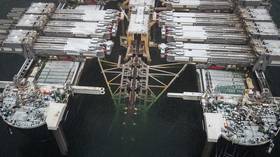Saudi Arabia wants to put pressure on Russia...but could it hurt itself instead?
While the world faces an unprecedented crisis over the coronavirus pandemic, Riyadh is trying to push other countries to play by its rules in the oil market, but those actions could have backfired.
Since the OPEC+ deal collapsed, Saudi Arabia has brought out the big guns to grab the market share, but the move eventually drove crude prices to new lows. After Moscow and Riyadh failed to reach a new production-cut deal in early March, the kingdom decided to boost production and granted discounts to its oil buyers.
Also on rt.com Saudi Arabia denies trying to kill US shale, shifts blame for oil supply glut on Russia“I think they’re trying to put pressure, especially on Russia, so they could come to agree with what they were trying to push over during the last OPEC meeting,” Roberto d’Ambrosio, the CEO of Axiory Global, said in an interview to RT.
If the situation in the oil market does not improve, US shale companies will be hit hard, as shale oil makes sense only when oil prices are at least $40 a barrel. While they can be kept afloat with some government assistance, the crisis could turn “deadly” for them, according to the analyst. This is how Riyadh could be trying to make its overseas ally join it in pressuring Moscow, he adds.
However, the Saudi Arabian economy is reliant on oil revenues and if the oil crisis holds too long, it would cause massive problems for the world’s major oil producer and even the low production costs it enjoys wouldn’t help, d’Ambrosio stressed.
“It doesn’t mean that they [Saudi Arabia] will not suffer at this level, because they depend almost entirely on oil. So if you reduce the amount of profit they can have that would be a problem for them,” he said.
If the players don’t come to terms, they are playing a “very dangerous game.” D’Ambrosio believes that the agreement on additional production caps is necessary even if US shale producers vanish, as their market share is not enough to create the deficit needed to boost the prices.
For more stories on economy & finance visit RT's business section















